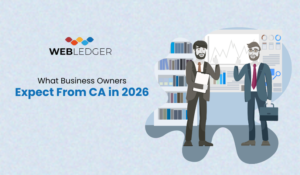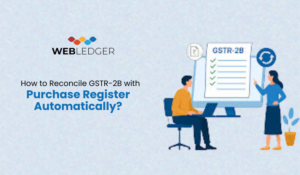
Easy Online Accounting for Small Businesses
Starting a small business is a thrilling adventure with passion, sweat, and the thrill of creating something from the base. However, one thing that most small business owners fear is accounting. The mere mention of terms such as debits, credits, and balance sheets could be confusing.
But what if controlling your accounts didn’t have to be so worrying? What if there was a way to simplify it, save time, and know your company’s financial status without requiring an accounting degree? The best news is that there is a solution! Welcome to online accounting for small businesses.
In this blog, we will be discussing everything you need to know about utilising online accounting. It can assist you in gaining control of your finances so that you can focus on what matters most – i.e. expanding your business.
Why Traditional Accounting Hurts Small Businesses?
Now let’s discuss the issues that old-school manual accounting causes small business owners:
Webledger
Please enter the OTP below to proceed.
Time-Consuming: Handwriting down each transaction, balancing bank statements, and generating financial reports require much time that could otherwise be dedicated to operating the business.
Prone to Errors: Blunders can occur, particularly while working with a lot of financial information. Calculation mistakes during manual computations can bring about inaccurate reports and incorrect expenditures.
Lack of Real-Time Visibility: Traditional methods usually only show a past view of your finances. This makes it difficult to understand your cash flow and financial position in real-time, which can delay decision-making.
Storage and Organisation Problems: Paper records could get messy very quickly, and it becomes difficult to find the documents you’re looking for. Physical storage also occupies valuable office space.
Limited Accessibility: You tend to have to be at the office to get financial data, so it’s difficult to manage your finances when you’re even travelling.
Expensive Professional Fees: Most small businesses outsource bookkeeping and tax preparation to outside accountants. This can be a significant cost, particularly when the business is new.
The Rise of Easy Online Accounting Solutions
The age of technology has revolutionised the way small businesses handle finances. Online Accounting Software provides an easy and effective alternative to traditional methods, assisting you in automating and streamlining financial tasks.
Accounting software is computer-based software that allows you to handle your business finances anywhere in the world with Internet connectivity. They offer various features that automate accounting processes, making them more efficient, accurate, and easily accessible.
Key Advantages of Online Accounting for Small Firms
Switching to online or cloud-based accounting can advantage your small firm in several ways:
Time Save: The majority of online accounting software offers automated features such as bank reconciliation, recurring invoice creation, and report generation. This saves you and your staff precious time.
Increased Accuracy: Automation eliminates the chance of human error in calculations and inputting data, which results in precise financial data and reports.
Real-Time Financial Insights: Online accounting provides you with a real-time picture of your company’s financial position. You can view your cash flow, profits, and outstanding invoices at any time, which enables you to make effective decisions.
Better Organisation: Your financial information is safely kept in the cloud, eliminating the need for storage space. It is simple to locate and access information when required.
Accessibility from Anywhere: You can use the online accounting software on any device and on anytime with an Internet connection, that will enable you to manage your finances on the move.
Collaboration and Sharing: Most online accounting applications allow you to invite your accountant or team members to view your data. This enhances collaboration and communication.
Cost-Effectiveness: Although online accounting software typically entails a subscription charge, it may be less expensive than having a full-time bookkeeper or using outside accounting services.
Scalability: As your business expands, your online accounting software can expand with you, offering more sophisticated features as your needs evolve.
Integration with Other Business Applications: Most of the online accounting systems integrate with other leading business software, including CRM tools, online shopping carts, and payment gateways. This facilitates smooth data flow and eliminates the need for manual data input.
Must-Have Features in Online Accounting Software
When selecting online accounting software for your small business, keep these essential features in mind:
Invoicing: Find software that allows you to easily create and send clean, professional-looking invoices. It should be able to track payments and automatically send reminders for late payments. Customisable templates, recurring invoices, and online payment features are a plus.
Expense Tracking: Tracking your business expenses is important so that you know profits and can claim deductions. The software should allow you to record and tag expenses and include receipts. Certain bookkeeping tools also have the ability to connect to your bank and bring in transactions automatically.
Financial Reporting: You require access to vital financial statement reports such as profit and loss statements, balance sheets, and cash flow statements. Seek out customisable reports that you can export in different formats.
Contact Management: A list of your customers and suppliers comes in handy for sending out invoices and receiving payments.
Inventory Management (if required): If you’re selling physical items, look for software that assists you in monitoring inventory quantities and prices.
Payroll Integration (if applicable): If you have employees, select software that integrates with payroll systems to record their attendance and leaves to simplify payroll processing and compliance.
Tax Preparation Capabilities: Certain accounting software can assist with tax preparation by providing tax-related reports and allowing you to work more easily with your tax advisor.
Security: Make certain the software is highly secure with features such as data encryption and two-factor authentication to safeguard your financial information.
User-Friendliness: The interface needs to be easy to use, even if you are not an accounting professional. Find one with an easy-to-use interface and quality support materials.
Mobile Accessibility: It’s a bonus to access your finances from anywhere using a mobile application.
Customer Support: Having quality customer support for assistance with any problems or queries regarding the software is important.
Getting Started with Online Accounting: A Step-by-Step Guide
Online accounting can seem daunting, but you can simplify the process by implementing these steps:
1) Evaluate Your Needs:
Consider what accounting features you require for your small business. Think about your present problems and what you wish to accomplish using online accounting.
2) Compare and Research Software:
Check out various online accounting software. Compare their features, prices, and customer reviews. Try out a few with free trials.
3) Select a Platform:
Select the online accounting software that will best suit your requirements and budget.
4) Create Your Account:
Sign up on the selected platform and enter your business details, including your company name, address, and currency.
5) Link Your Bank Accounts:
Connect your business credit cards, bank accounts, etc., to the software system. This will automatically import your transactions and save you time.
6) Set Up Your Preferences:
Tailor your invoice designs, payment periods, and other options to align with your company branding and business procedures.
7) Existing Data Importing (if possible):
Should you have some financial information available in spreadsheets or other packages, review the method of importing those records into your new online accounts program.
8) Learn the Software:
Take a few minutes to familiarise yourself with the features and tools of your selected platform. Most offer tutorials and assistance to guide you.
9) Begin Recording Transactions:
Start recording your income and expenses. Ensure that you classify your transactions appropriately for proper reporting.
10) Balance Your Bank Accounts on a Regular Basis:
Compare your bank statements to your accounting records regularly (e.g., weekly or monthly) to identify and correct any errors.
11) Create and Check Financial Reports:
Regularly make and examine key financial statement reports, to monitor how your business is financially performing.
12) Use Customer Support:
Choose to call the customer support of your software provider if you have any questions or come across issues.
13) Use Professional Help:
If you don’t know about certain accounting software and don’t know how to interpret it from your financial reports, consider consulting a qualified accountant or chartered accountant who is familiar with your online accounting software.
Mastering Online Invoicing
Invoicing is crucial to getting paid for your products or services. Online accounting software allows you to easily create and manage invoices. Here’s how:
Professional Templates: Most platforms offer customisable invoice templates. You can put your logo and branding on it to give it a professional touch.
Easy Creation: To make an invoice, choose a customer, enter line items for your products or services, enter quantities and prices, and specify payment terms.
Automated Calculations: The software automatically calculates totals, including taxes and discounts, reducing errors.
Recurring Invoices: If you have customers who order regularly, you can create recurring invoices that are automatically generated and sent.
Payment Tracking: The software follows the progress of your invoices so you can see what you have sent, opened, and paid.
Automated Reminders: Automated reminders are available for customers with outstanding invoices, enhancing your collection process.
Online Payment Options: Through integration with payment processors, your customers can settle invoices online through credit cards, bank transfers, or other payment methods. It becomes convenient for them and accelerates your cash flow.
Invoice History: All your invoices are stored electronically, making it easy to access past invoices and track your sales history.
Mastering the use of the invoice features of your online accounting software efficiently enables you to simplify billing, receive payments quicker, and have improved control of your accounts receivable.
The Future of Online Accounting for Small Businesses
Online accounting is evolving day by day. New features and technologies emerge every now and then. More applications of AI and machine learning can be expected, which will help in automating tasks and delivering predictive information. Mobile-responsive design will become even more prevalent, allowing small business owners to manage their finances effortlessly on their tablets and smartphones. We will also witness greater integration with other business management tools, providing a clearer picture of business operations.
Conclusion
In today’s fast-paced business world, small businesses need every edge they can find. Online accounting is a powerful and accessible way to manage finances better. It saves time, minimises errors, and provides useful insights into business performance. With the right tools and expertise in online invoicing, you can gain control of your finances and concentrate on expanding your business and achieving your goals.
Webledger Books is a cloud-based accounting software, helping you with all the relevant features and more. Want to know more about Webledger Books? Sign up and book a free trial today of Webledger Books.




